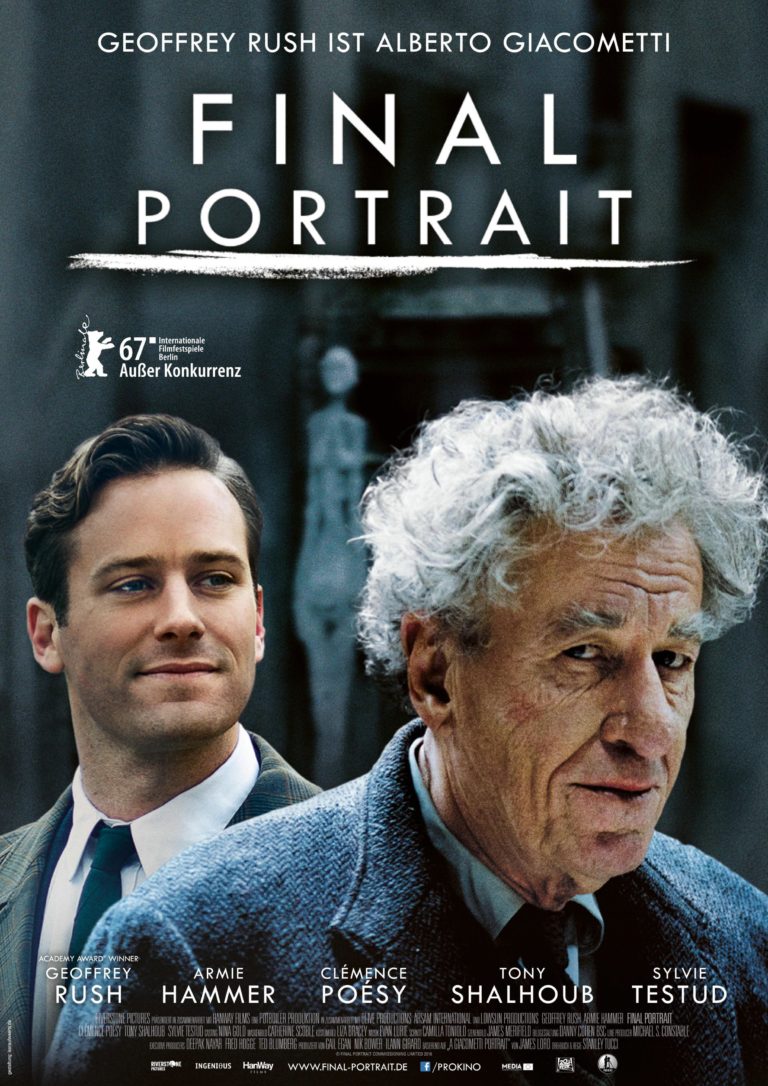“Colorful Portrait of a Disheveled, Immoral Personal Life”

| None | Light | Moderate | Heavy | |
|---|---|---|---|---|
| Language | ||||
| Violence | ||||
| Sex | ||||
| Nudity |
What You Need To Know:
This biopic paints a picture of the life of this tortured artist. Directed by Stanley Tucci and starring Geoffrey Rush, the movie takes the viewer into this world. That said, FINAL PORTRAIT contains a high degree of questionable, immoral content. There are multiple examples of female nudity, including a visit by Alberto to a brothel to commit adultery, something which was a frequent occasion in his life. FINAL PORTRAIT also has plenty of foul language and a strong non-Christian, Romantic worldview. MOVIEGUIDE® advises extreme caution.
Content:
Very strong Romantic worldview as an artist allows his art and feelings to guide him throughout his life, there are no moral values to guide him, characters pursue what makes them feel good and happy above all else, artistic expression guides protagonist’s decisions as well as relationships, there is no mention of God or of any deity governing or providing a compass to live one’s life by, plus protagonist’s friend is homosexual but this is not stressed much;
At least, 26 obscenities (about 14 or 15 “f” words) and eight profanities;
Light violence, as two characters discuss what would be the best way to commit suicide and describe different methods in a bit of a graphic way, plus a prostitute’s pimps break in and trashes painter’s studio;
Strong sexual immorality includes married painter has an ongoing relationship with a prostitute, he and his wife both appear to have other lovers, implied adultery and fornication as married painter goes into a brothel and walks upstairs with a woman, and married painter Alberto pays prostitute’s pimps for the time she spends with him;
Full frontal female nudity in brothel and in a painting, upper female nudity while man paints a woman’s portrait, upper female nudity multiple times when painter walks into a brothel, rear female nudity, and scantily clad women in brothel;
Characters frequently have drinks, including wine, liquor, champagne, etc., but no examples of drunkenness;
Characters frequently smoke cigarettes, but no drug use; and,
Strong miscellaneous immorality includes multiple examples of a very unhealthy and destructive marriage, moral relativism is present throughout as the artist’s neurotic actions are never met with much consequence, and examples of infidelity and deception.
More Detail:
After a few hours of work, the artist concludes that enough work is done for the day. Soon after, a woman shows up at the studio, and Alberto seems to be completely smitten with her. They openly flirt and kiss, with his wife unhappily standing nearby. They leave and have a night out in Paris, eventually ending up in bed together.
The next day, Alberto and Lord begin their work again. Not long into the session, the artist exclaims loudly in dissatisfaction, completely unhappy with his work, stating that he can’t do anything right. He tells Lord he needs a few more days to work and asks him if he could possibly stay a few more days. Needing to leave to get back to New York, but also eager to finish the portrait, Lord agrees.
As the work proceeds, Alberto seems to get into a pattern of being unsatisfied with what he has done and the way he’s portraying Lord. He pleads with him to stay another week maximum, so that he gets the portrait done right.
Throughout his time posing for the artist, Lord is able to get a glimpse into the unstable life Alberto lives. He sees the prostitute Caroline bounce in and out of the artist’s life, leaving Alberto either full of life, or in a complete state of imbalance when she’s gone.
After almost an additional two weeks of painting, Lord begins to notice a pattern with the artist. As soon as the portrait is beginning to come together, Alberto becomes extremely unhappy with himself and his ability, and paints over his work to start again. Desperately in need to return home to New York, Lord decides he must manipulate the artist in a way to where he can really see how talented he is and how great the work is that he’s done.
FINAL PORTRAIT is based on recollections by James Lord, the author who experienced the artist and his neurosis first hand. Lord wrote acclaimed biographies of Giacometti and Picasso. Geoffrey Rush completely transforms for this role, becoming almost unrecognizable, not in appearance, but in character, as Giacometti. In the course of a few weeks in which the movie takes place, the viewer gets a first-hand look into the life of this artist. Since the movie takes place in the romantic city of Paris, and almost entirely set in Alberto Giacometti’s art studio, it’s easy for viewers immediately to feel a part of that world. Written and directed by actor Stanley Tucci, this biopic does true justice to the mad-professor artist.
That said, FINAL PORTRAIT contains a very high amount of questionable content, including lots of foul language, plus strong sexual content and explicit nudity. The tormented artist and his wife are anything but faithful to each other, and the infidelity does nothing but breed a terribly unhealthy marriage. Told with a Romantic worldview, FINAL PORTRAIT displays lots of moral relativism as the artist and other characters are driven by what feeds their feelings and happiness. Because of these elements, MOVIEGUIDE® advises extreme caution.


 - Content:
- Content: 

